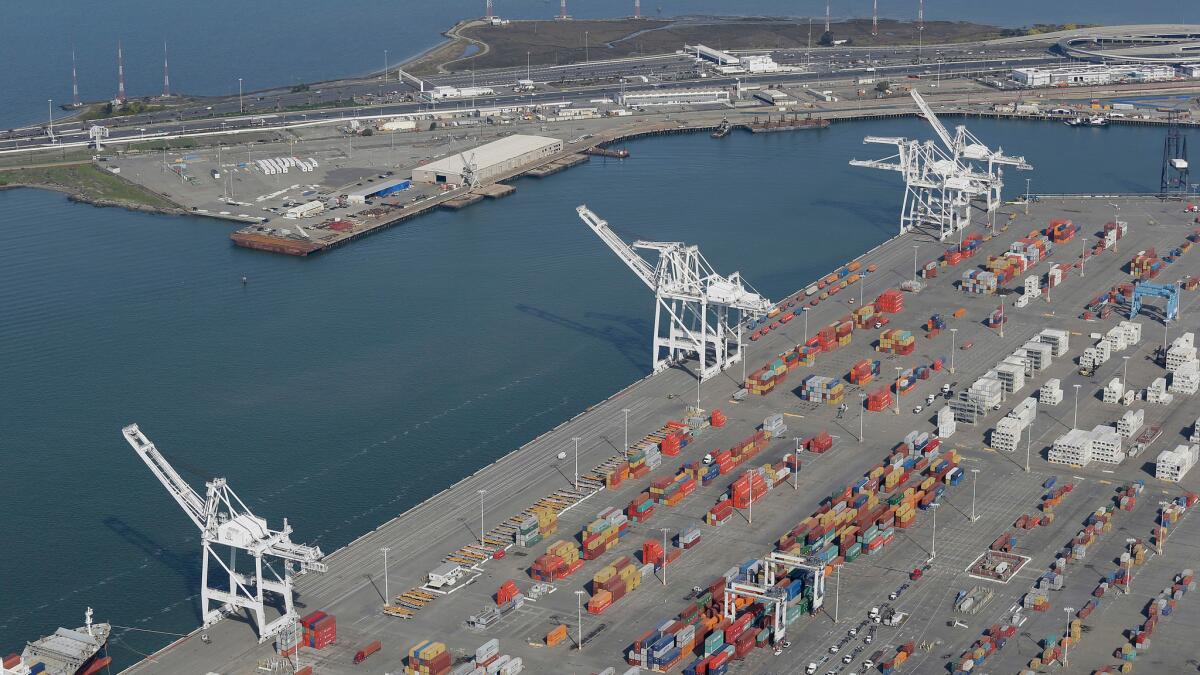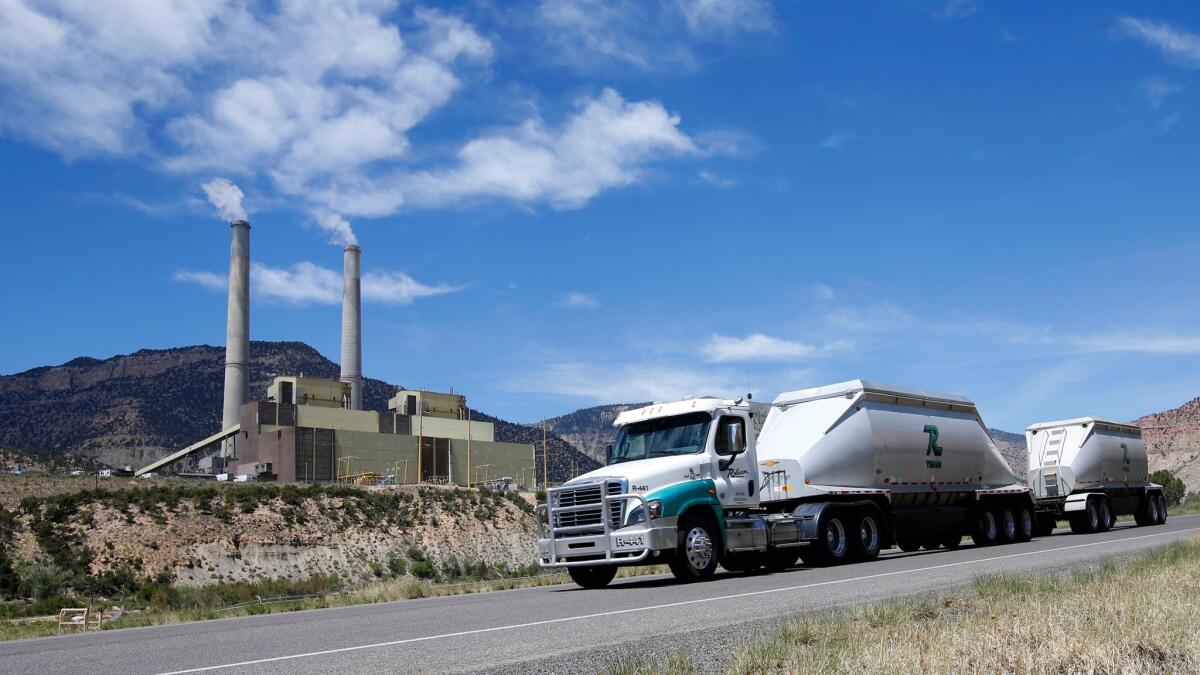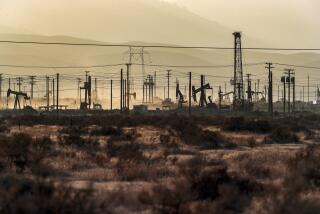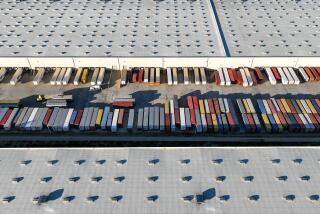Oakland bans coal shipments in a blow to planned export facility
Oakland city leaders have voted overwhelmingly to ban the storage and handling of coal within city limits, dealing a likely fatal blow to an effort to build what would be the largest coal export facility in California.
The city council voted unanimously Monday, with one member not present, on two ordinances related to the project. The ban also applies to petroleum coke. Under city policy, the ban will not receive final approval unless it is passed in a second vote, to be held July 19. That is widely expected to happen.
The vote came after four hours of sometimes raucous public testimony and more than a year after the issue first began roiling local politics.
Supporters of a ban cited studies showing pollution risks, including to industrial West Oakland, a part of the city that already suffers more than most places from severe rates of child asthma, cancer and other pollution-related diseases. They also said the ban would limit the burning of fossil fuels in Asia, the intended market for the coal.
Opponents said environmental concerns were overstated and that the terminal would bring much-needed jobs to a struggling, heavily African American community. They said improving economic health would improve public health.

The council overwhelmingly rejected that argument.
“It’s a false choice,” said council member Abel Guillen. “It’s not jobs versus the environment. We can do both.”
The vote presented a striking setback for a project long complicated by questions over how it would be financed and the intent of its developers.
The proposed terminal, which would be located on San Francisco Bay, adjacent to the Bay Bridge, has been led by Phillip Tagami, a prominent developer and a longtime friend of Gov. Jerry Brown.
Tagami initially said the project would not involve coal. But last year, his company worked secretly with state and local officials in Utah to arrange for that state to invest $53 million in federal money in the terminal to secure the right to export coal mined in Utah. After that initial effort stumbled, state lawmakers in Utah stepped in earlier this year and voted to fund the project, again by redirecting federal money.
For Utah, the stated goal has been to provide a guaranteed market for coal mined in the state’s rural south, a region hit hard by the declining domestic coal market. But the investment met opposition in Utah, with conservation groups opposing it and newspapers editorializing against it, in part because it was viewed as fiscally unwise.

Still, opposition in Oakland was far more intense. In 2014, the city passed a nonbinding resolution opposing the transportation of coal, petroleum coke and crude oil in the city. Last year, Mayor Libby Schaaf engaged in a public feud with Tagami, accusing him of misleading the public about his plans.
Hundreds of people attended the council meeting Monday. Early on, opponents of the ban were particularly raucous, accusing the council of siding with environmentalists over jobs for its most impoverished residents. Momentum swung strongly the other way as the evening wore on, with labor leaders, healthcare workers, activists from Utah and the Sierra Club and even several high school students all speaking in support of the ban.
A lawyer for Tagami’s company, California Capital and Investment Group, said in a letter on Monday that the company would take the city to court if the council approved the ban.
Coal exports at other California ports have been declining, partly because of growing international opposition to the fuel’s use.
“Everybody, including the Chinese, has decided that heavily polluted air is not a good idea,” said Jock O’Connell, a trade expert at the Los Angeles consulting firm Beacon Economics.
Stockton exported about $121 million in coal last year, down from $166 million in 2014, O’Connell said.
Long Beach, the nation’s second-busiest port, had been exporting about 1.5-million metric tons of coal in recent years, but in 2015 that dipped to 500,000 metric tons, according to the port’s spokesman, Lee Peterson. Much of that coal came from Utah, Peterson said, but he added that port officials “wouldn’t expect to see a great increase” in that business after the Oakland vote.
At the port in Richmond, which is also in the Bay Area, the privately-owned Levin-Richmond terminal said that its coal exports have declined by 75% since 2014 and that the company now ships around 30,000 metric tons of coal per month at most. Patrick O’Driscoll, the vice president of terminal operations at Levin-Richmond, said he did not think the company would get a traffic boost from the Oakland move.
“I just don’t think there’s enough business that would support that,” O’Driscoll said. “The market is dead all over.”
Mayor Schaaf’s office helped draft the Oakland ordinance with a council member, Dan Kalb. In an interview Monday, the mayor emphasized what council members said later in the day — that they all wanted to see a terminal built at the planned location, the site of a former Army base. They just do not want it to export coal.
“No person should ever have to choose between a job and their health and safety,” the mayor said. “There are plenty of other commodities. Plenty of other economic activity that is going to be successful in this project.”
The mayor said she and Gov. Brown have spoken informally about the project. The governor has not taken a position on it publicly.
“He’s spoken quite passionately about the need to leave coal in the ground,” Schaaf said. “He may not have spoken about this particular project but his general stances and advocacy on this issue, I think, speaks volumes.”
Staff writer Natalie Kitroeff contributed to this report.
Twitter: @yardleyLAT
ALSO
Gov. Jerry Brown signs $171-billion state budget
California has a lot more water than some think, new Stanford study suggests
Laguna Beach cafe owners file countersuit against Muslim women who alleged discrimination
UPDATES:
3:40: This post has been updated with more comments.
2:09 p.m.: This post has been updated with information about exports at other ports and more comments.
June 28, 9:30 a.m.: This article has been updated with staff reporting.
The first version of this post was published June 27 at 10:58 p.m.
More to Read
Sign up for Essential California
The most important California stories and recommendations in your inbox every morning.
You may occasionally receive promotional content from the Los Angeles Times.











